
"Get Back" is a song recorded by the English rock band the Beatles and Billy Preston, written by Paul McCartney, and credited to the Lennon–McCartney partnership. It was originally released as a single on 11 April 1969 and credited to "The Beatles with Billy Preston". The song is one of the few examples of John Lennon featuring prominently as lead guitarist. The album version of this song contains a different mix that features a studio chat between Paul McCartney and John Lennon at the beginning, which lasts for 20 seconds before the song begins, also omitting the coda featured in the single version, and with a final dialogue taken from the Beatles' rooftop concert. This version became the closing track of Let It Be (1970), which was released just after the group split up. The single version was later issued on the compilation albums 1967–1970, 20 Greatest Hits, Past Masters, and 1.

Rolf Harris was an Australian musician, television personality, painter, and actor. He often used unusual instruments like the didgeridoo and the Stylophone in his performances, and is credited with the invention of the wobble board. He was convicted in England in 2014 of the sexual assault of four underage girls, which effectively ended his career.

"The Dreaming" is the title song from Kate Bush's fourth studio album The Dreaming and was released a single on 26 July 1982. "The Dreaming" made it to No. 48 on the UK Singles Chart.
The wobble board is a musical instrument invented and popularized by Australian musician and artist Rolf Harris, and is featured in his best-known song "Tie Me Kangaroo Down, Sport". A wobble board, like some other musical instruments, can be ornately decorated because its large surface area can act as a canvas without detracting from its musical capability.

"The Long and Winding Road" is a song by the English rock band the Beatles from their 1970 album Let It Be. It was written by Paul McCartney and credited to Lennon–McCartney. When issued as a single in May 1970, a month after the Beatles' break-up, it became the group's 20th and last number-one hit on the Billboard Hot 100 chart in the United States.

"Let It Be" is a song by the English rock band the Beatles, released on 6 March 1970 as a single, and as the title track of their album Let It Be. It was written and sung by Paul McCartney, and credited to the Lennon–McCartney partnership. The single version of the song, produced by George Martin, features a softer guitar solo and the orchestral section mixed low, compared with the album version, produced by Phil Spector, featuring a more aggressive guitar solo and the orchestral sections mixed higher.
The Money or the Gun was an Australian comedy/talk-show on the ABC network. It ran from late 1989 to mid-1990, with occasional specials until 1994. It was written by Andrew Denton, Simon Dodd, Bruce Griffiths, and George Dodd, directed by Martin Coombes and produced by Mark Fitzgerald.

"From Me to You" is a song by the English rock band the Beatles that was released in April 1963 as their third single. It was written by John Lennon and Paul McCartney. The song was the Beatles' first number 1 hit on what became the official UK singles chart but the second, after "Please Please Me", on most of the other singles charts published in the UK at the time. "From Me to You" failed to make an impact in the United States at the time of its initial release. Instead, a 1963 cover version released by Del Shannon resulted in the song's becoming the first Lennon–McCartney track to enter the US pop charts. The Beatles' original was rereleased in the US in January 1964 as the B-side to "Please Please Me", and reached number 41.
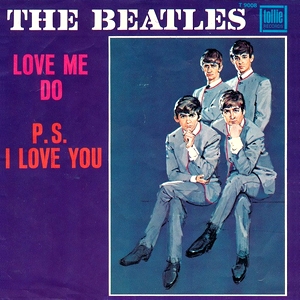
"Love Me Do" is the debut single by the English rock band the Beatles, backed by "P.S. I Love You". When the single was originally released in the United Kingdom on 5 October 1962, it peaked at number 17. It was released in the United States in 1964 and topped the nation's song chart. Re-released in 1982 as part of EMI's Beatles 20th anniversary, it re-entered the UK charts and peaked at number 4. "Love Me Do" also topped the charts in Australia and New Zealand.
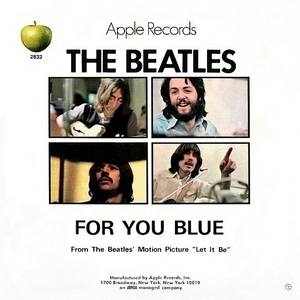
"For You Blue" is a song by the English rock band the Beatles from their 1970 album Let It Be. The track was written by George Harrison as a love song to his wife, Pattie Boyd. It was also the B-side to the "Long and Winding Road" single, issued in many countries, but not Britain, and was listed with that song when the single topped the US Billboard Hot 100 and Canada's national chart in June 1970. On the Cash Box Top 100 chart, which measured the US performance of single sides individually, "For You Blue" peaked at number 71.
"Across the Universe" is a song by the English rock band the Beatles. It was written by John Lennon and credited to Lennon–McCartney. The song first appeared on the 1969 various artists' charity compilation album No One's Gonna Change Our World and later, in a different form, on their 1970 album Let It Be, the group's final released studio album. The original version featured on two different albums both titled Rarities: a 1978 British release and a 1980 US release. It was also included on their 1988 album Past Masters, Volume Two. The song has been covered by many artists, including David Bowie on his 1975 album Young Americans, which featured contributions from Lennon.

"Please Please Me" is a song released by the English rock band the Beatles. It was their second single in the United Kingdom, and their first in the United States. It is also the title track of their first LP, which was recorded to capitalise on the success of the single. It is a John Lennon composition, although its ultimate form was significantly influenced by producer George Martin.
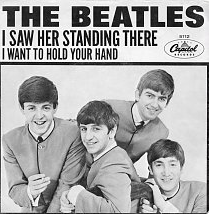
"I Saw Her Standing There" is a song by the English rock band the Beatles, written by Paul McCartney and John Lennon. It is the opening track on the band's 1963 debut UK album Please Please Me and their debut US album Introducing... The Beatles.
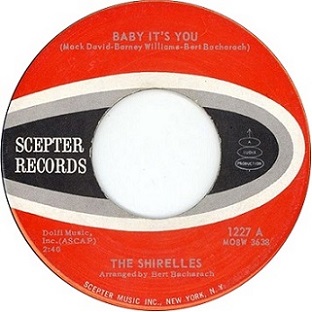
"Baby It's You" is a song written by Burt Bacharach (music), Luther Dixon, and Mack David (lyrics). It was recorded by the Shirelles and the Beatles and was a hit for both. The highest-charting version of "Baby It's You" was by the band Smith, who took the track to No.5 on the US charts in 1969.
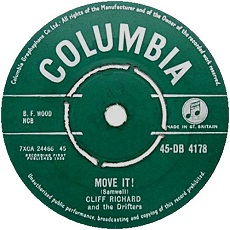
"Move It" is a song written by Ian Samwell and recorded by Cliff Richard and the Drifters. Originally intended as the B-side to "Schoolboy Crush", it was released as Richard's debut single on 29 August 1958 and became his first hit record, reaching number 2 on the UK Singles Chart. It is credited with being one of the first authentic rock and roll songs produced outside the United States. "Schoolboy Crush", written by Aaron Schroeder and Sharon Gilbert, had already been recorded in the US by Bobby Helms. Cliff Richard and the Drifters recorded their own version, which was intended to be the A-side of their debut single. However, when producer Jack Good heard "Move It", he insisted that Richard would have to sing that if he was to appear on Good's TV show Oh Boy! On the planned single, "Move It" was flipped to be the A-side and it went to number 2 in the charts, starting Cliff Richard on a career which included British hits through six decades.
"Release Me", is a popular song written by Eddie "Piano" Miller and Robert Yount in 1949. Four years later it was recorded by Jimmy Heap & the Melody Masters, and with even better success by Patti Page (1954), Ray Price (1954), and Kitty Wells (1954). Jivin' Gene [Bourgeois] & the Jokers recorded the tune in 1960, and that version served as an inspiration for Little Esther Phillips, who reached number one on the R&B chart and number eight on the pop chart with her big-selling cover. The Everly Brothers followed in 1963, along with Lucille Starr including a translation in French (1964), Jerry Wallace (1966), Dean Martin (1967), Engelbert Humperdinck (1967) who was number one on the UK Singles Chart and many others in the years after such as Jewels Renauld (2022).
"Nobody's Child" is a song written by Cy Coben and Mel Foree and first recorded by Hank Snow in 1949. Many other versions of this song exist.

The discography of Australian musician, singer-songwriter, painter and television personality Rolf Harris consists of 30 studio albums, 2 live albums, 4 compilation albums, and 48 singles. He often used unusual instruments in his performances: he played the didgeridoo and the stylophone and is credited with the invention of the wobble board. Harris also collaborated with other artists, including Kate Bush, Rick Parfitt, and The Wiggles.

"Sun Arise" is the fourth single released by Australian singer-songwriter Rolf Harris. Released in January 1961 in Australia and October 1962 in the UK, it was Harris' third charting hit in Australia and second in the UK. Unlike his early chart hits, "Sun Arise" was not a comedy record, but came within the genre of world music with its didgeridoo-inspired sound. It was produced by George Martin.

It's a Wiggly Wiggly World is the tenth album by Australian band The Wiggles, released in 2000 by ABC Music distributed by EMI. It was nominated for the 2000 ARIA Music Award for Best Children's Album but lost to Hi-5's Jump and Jive with Hi-5.














